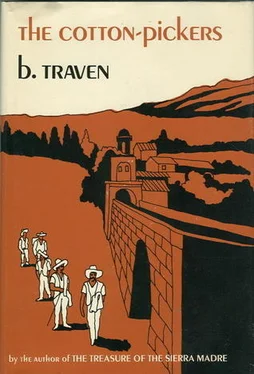B. Traven - The Cotton-Pickers
Здесь есть возможность читать онлайн «B. Traven - The Cotton-Pickers» весь текст электронной книги совершенно бесплатно (целиком полную версию без сокращений). В некоторых случаях можно слушать аудио, скачать через торрент в формате fb2 и присутствует краткое содержание. Год выпуска: 1969, Издательство: Hill and Wang, Жанр: Проза, на английском языке. Описание произведения, (предисловие) а так же отзывы посетителей доступны на портале библиотеки ЛибКат.
- Название:The Cotton-Pickers
- Автор:
- Издательство:Hill and Wang
- Жанр:
- Год:1969
- ISBN:нет данных
- Рейтинг книги:3 / 5. Голосов: 1
-
Избранное:Добавить в избранное
- Отзывы:
-
Ваша оценка:
- 60
- 1
- 2
- 3
- 4
- 5
The Cotton-Pickers: краткое содержание, описание и аннотация
Предлагаем к чтению аннотацию, описание, краткое содержание или предисловие (зависит от того, что написал сам автор книги «The Cotton-Pickers»). Если вы не нашли необходимую информацию о книге — напишите в комментариях, мы постараемся отыскать её.
—Book World
The Cotton-Pickers — читать онлайн бесплатно полную книгу (весь текст) целиком
Ниже представлен текст книги, разбитый по страницам. Система сохранения места последней прочитанной страницы, позволяет с удобством читать онлайн бесплатно книгу «The Cotton-Pickers», без необходимости каждый раз заново искать на чём Вы остановились. Поставьте закладку, и сможете в любой момент перейти на страницу, на которой закончили чтение.
Интервал:
Закладка:
Señor Doux was always to be seen in shirt and trousers, and only when he went to the market did he put on a hat. He wore black trousers only, secured with a narrow leather belt, and a white shirt with a black bow tie. His belly stuck out in front of him like a balloon. The Señora too had a protruding paunch, but it was hidden in part by the loose negligee. Alas, what she had too much of in front she lacked behind. That isn’t to say that there wasn’t plenty behind, but the proportions in relation to her stomach were not generous enough to give her whole figure a harmony. All in all Doux could hardly complain, for he had in her something solid to hold on to, and was in no danger of chafing himself on protruding bones.
“You must have been off your head ever to have come to this crazy country,” she was yelling at him.
“Me? Wasn’t it you who kept telling me every day that millions were lying on the streets waiting to be shoveled up?”
“You dirty liar, you!” she howled. “You filthy Marseilles pimp! Didn’t you draw out all my money and tell me that it’d earn a thousand percent in two years?”
“Well, wasn’t I right? We came here with nothing — or how much was it? Eight hundred pesos? And I’ve already been offered sixty-eight thousand for the house and café. And why don’t I sell? Because I know it’s worth much more.”
“Worth more?” she blazed. “Why, it’s not worth a handful of horse shit! How can it be worth anything when it’s closed? No one would give you the price of the bricks in it. And I told you that when the new government came in, that — what’s-hisname? — that pig, one-armed general, that Obregon — yes, that’s his name! He finished us off for good.”
“How could I know this Revolution would change everything, even the value of the money, labor conditions, laws that affect property and all and everything that goes with it? But it’s only since the new government that we’ve really begun to get anywhere. You wouldn’t say that it was before then, eh? — when we had to grease everybody’s palm with one hundred pesos, one after the other, for permission to breathe, even. Everybody was holding out a hand then.”
“And now,” she fired back at him, “is it any different? Now it’s the working people who are holding out their hands. First in the kitchen, then the waiters, and you’ll see, next will be the bakehouse. And when that comes, we might as well pack up and go home like beggars.”
“Shut up, confound you!” he shrieked in full fury. “You spoil everything with your greed and your damned miserliness.”
“Me, miserly? Miserly? If I didn’t keep a hold on the money it would all go on you and your whores. And you call me miserly?”
Now we were hearing some fine family secrets. I could hardly believe the Señora was right; how could he have possibly found time for escapades? But of course their little dispute was really a conjugal dialogue, for they actually lived together in complete harmony which was disturbed only by the fact that the workers were waking up and taking an interest in their masters’ profits. Similar displays of interest have been known to shake kings and to rock empires. So it wasn’t surprising that the striking waiters gave the Douxs’ domestic bliss a bit of a shaking.
The conjugal dialogues became not only more violent during the following days but also more frequent. They filled the days, and extended through the nights as the Douxs lay side by side in bed. We who were working there overheard the complete life history of each of them, from the day they were born to the moment when they came to blows with table lamp, wash basin, and chamber pot.
When they reached the stage where she was going around with the idea of putting rat poison into his coffee, and he was dreaming nightly of the razor with which he was going to slit her throat, he proved the superiority of man.
He went to the Superintendent of Police and asked what could be done to get the two months’ closing order revoked and the waiters back into his café. The Superintendent told him that he himself could do nothing in this case. It was a matter of coming to terms with the union; the café couldn’t be operated until the dispute between the two was settled.
“Then I’m bankrupt,” said Doux. “And the waiters will be thrown out of work.”
“Don’t worry about them, señor,” the Superintendent replied. “As long as people want to sit in a café and spoon up strawberry ice, they’ll want waiters to serve them. You can see that from the Moderna, which is always full now. All your old customers go there, of course. But I can’t do anything about it. Your premises are closed, and they’ll stay closed for the two-month period. My advice is, go to the union and arrange things with them.”
On the afternoon of the same day Doux met Morales, whom he approached with all humility.
“Listen, Morales,” he said, “I’ll agree to everything. Could you see to it that the waiters return to my place?”
Morales eyed him coolly from head to foot and said: “Do I know you? Oh, yes, you’re Doux of La Aurora. But we waiters have nothing to do with you; we walked out remember? If you want anything with us, you must go to the union. Adios.”
Doux wrote a letter to the union saying that he would like an interview with the Secretary; he ventured to ask the Secretary to call on him to discuss the situation of the waiters’ strike.
On the following day he received his reply. It was just one sharp sentence: “If you want anything from the union, the address of the office is: Calle Madero No. 18, Second Floor. The Secretary hadn’t even considered it necessary to sign his name.
For Señor Doux there was no alternative but to go, for the razor was haunting him day and night, so that even when he was eating he had the feeling that his table knife was a razor.
“Take a seat in the waiting room,” said a worker in the union office. “There’s a conference on, but it won’t last long.”
It lasted over half an hour, and while he was waiting Doux had time to digest the slogans displayed on the walls. Those slogans made him angry at first. But the longer he studied them, the more he came to fear what lay in store for him behind the Secretary’s door, through which he could hear the tapping of a typewriter.
At last a worker appeared. “The Secretary will see you now, Señor,” he said.
Doux swallowed nervously as he stepped into the small room that was the Secretary’s office. He had intended to look the Secretary straight in the eye, but he found that he couldn’t; again, his gaze was drawn to the walls, for behind the Secretary’s desk the entire wall was covered with a red and black flag, while above the flag in bold letters screamed the slogan: PROLETARIOS DEL MUNDO, UNIOS!
This put Doux quite off his stride. His voice, which he had wanted to sound firm and resolute, faltered timidly as he said: “Good day. I am Señor Doux of the Café Aurora.”
“Right,” said the Secretary. “Sit down. And what do you want?”
“I’d like to know if you can arrange for my café to be reopened.”
“Yes, that can be arranged,” the Secretary replied, “provided you fulfill certain conditions.”
“Oh, I’m ready to agree to everything that the waiters are demanding.”
The Secretary took up a sheet of paper, glanced at it, and said: “The waiters’ demands are no longer the same as those put forward when they first spoke with you.”
“Not the same?” gulped Doux, frightened.
“No, it’s fifteen pesos a week now,” said the Secretary in the manner of a businessman.
“But they were asking twelve.”
“That may be. But then they went on strike. You don’t suppose the men are going to strike for nothing, do you? Now it’s fifteen. If you’d agreed at once it’d have been twelve.”
Читать дальшеИнтервал:
Закладка:
Похожие книги на «The Cotton-Pickers»
Представляем Вашему вниманию похожие книги на «The Cotton-Pickers» списком для выбора. Мы отобрали схожую по названию и смыслу литературу в надежде предоставить читателям больше вариантов отыскать новые, интересные, ещё непрочитанные произведения.
Обсуждение, отзывы о книге «The Cotton-Pickers» и просто собственные мнения читателей. Оставьте ваши комментарии, напишите, что Вы думаете о произведении, его смысле или главных героях. Укажите что конкретно понравилось, а что нет, и почему Вы так считаете.











